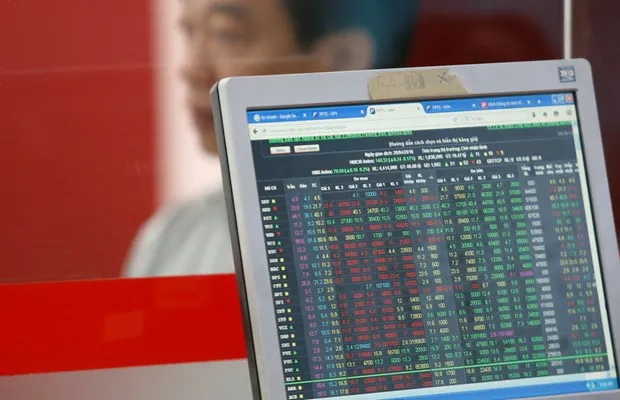
In fact, if we look at it from an international perspective and see the margin cash flow of securities companies, we will see that capital sources are supporting the movement in the stock market in the near future.
Foreign currency reversed
In October, foreign investors strongly continued net selling at value of upto VND 1,300 bn through orders matching on HOSE. Stock groups that were strongly net selling were VIC (Vingroup) VND 397 bn; VHM (Vinhomes) VND 272 bn; VRE (Vincom Retail) VND 177 bn; MSN (Masan) VND 221 bn; and HPG (Hoa Phat) VND 213 bn.
On the opposite side, stock groups that were net bought were VCB (Vietcombank) VND 226 bn; BID (BIDV) VND 102 bn; ROS (FLC Faros) VND 91 bn; and fund certificates VFMVN30 with VND 74 bn. ETFs had net withdrawn about USD 9.5 mn in October. Although the total value did not change much compared to September (nearly USD 12 mn), it was different from before when large ETF funds had simultaneously withdrawn capital, there are still funds to buy at the moment. For example, VFMVN30 ETF and FTSE ETF unexpectedly attracted net capital of USD 1.25 mn and USD 2.88 mn.
However, according to Rong Viet Securities Co (VDSC), in developed markets, government bond yields are increasing again since the end of August and early September. This shows that the cash flow is looking for safe shelter channels in government bonds. In other words, investors expectation about recession risk has started to decline.
In addition, the possibility that the US Federal Reserve (FED) will continue lowering interest rates from now until the end of the year is not high, so finding opportunities for stock investment in developed markets, typically the US, is no longer easy. The reason is that the P/E level of the S&P 500 has reached a one-year peak. In this context, it is expected that foreign cash flow will pour money into the stocks of new markets, including Vietnam.
Cash flow of securities companies
According to statistics from the third quarter business results of 73 securities companies, total income and operating expenses were at VND 6,042 bn (up 14.6%) and VND 3,335 bn (up 52.8%), respectively. In particular, capital trading and proprietary trading are the two segments with the highest proportion in the income structure, with income growth of 35% and 29%, respectively.
To serve this demand, securities companies have to speed up capital mobilization, resulting increase in cost of these two segments at 59% and 140%. The increase in expense of capital trading could come from an increase of borrowings by securities companies to serve margin activities. In terms of profit structure, the capital trading had the most contribution with more than VND 1,163 bn, accounting for 43.0% of total operating profit. Capital trading is also the only segment that recorded an increase in profits. Meanwhile, brokerage and services showed the least contribution with VND 386.4 bn, accounting for 14.3% of total operating profit.
Although the results of securities companies in the third quarter, and nine months of 2019 dropped sharply, the interest from margin lending still increased significantly. According to VDSC statistics, the total margin debit balance at the end of the third quarter was 34% higher than the average of the fourth quarter of 2018, equivalent to an increase of more than VND 12,000 bn, four times the value of average trading volume per session after nine months. In particular, three securities companies with capital from Korea are Mirae Asset, KB and KIS, accounting for more than 37% of the increased margin debit balance.
In contrast, local securities companies also stepped up mobilizing with low interest rates to serve margin activities to keep market share. With this competition, margin interest rates are pulled down, contributing to encouraging investors to promote margin activities when the market flourishes. In fact, after VN Index reestablished the 1,000 point, the cash flow from domestic investors started flowing strongly into the market, with many sessions exceeding VND 4,000 bn. Even foreign investors strongly net bought after the VN Index reestablished the 1,000 point.
Two scenarios for VN Index
According to BIDV Securities (BSC), foreign investors net sales decreased, with positive changes from Q3 business results of listed companies and the effect of buying fund shares of blue-chip stocks, and VN Index heading to the next threshold of 1,050 points. The large stock plays a leading role, forming a new price level, before spreading to the stock groups with improved business results and positive prospects. BSC also issued two scenarios for the VN Index in November.
In Scenario one, the VN Index rises to 1,050 points and maintains above the 1,000-point mark, with improved liquidity and more pronounced industry rotation. In negative scenario, VN Index may drop below 983 points if there is adverse information from the world and the pressure to divest from foreign investors.
The remarkable event in November is that the amended Securities Law will be voted for at the 8th Session of the 14th National Assembly. Some contents of the draft Securities Law still have different opinions, such as offering shares at lower price than real denominations; conditions for offering securities to the public; private offering of bonds by issuers that are not public companies; private offering securities of innovative startups; responsibilities and powers of the State Security Commission of Vietnam (SSC); organization of Vietnam Stock Exchange; and ownership ratio of foreign investors and foreign-invested economic organizations.
According to analysts, when the new Securities Law is passed, it will create a legal corridor, open bottlenecks in foreign ownership as well as create conditions for securities companies to expand their business activities, fulfilling investor needs and help the market operate effectively.




















